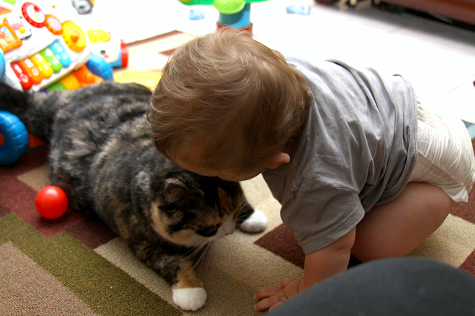

Ethan loves his kitties. He always has, since the moment he began noticing them. Though a couple of them may love him a bit less now that he can chase them across the hall, there's little that compares to the way Ethan belly laughs and imitates their "MEOWWW!" as he chases them across the hall.
I recently stumbled across a few studies that I'm totally on board with. The headline? Pets May Reduce Children's Allergy Risk. But wait. It gets even better, animal lovers. Children Who Had a Dog or Cat as Infants Less Likely to Become Allergic, declares the subtitle.
The article continues on: having a dog or cat at home during the first year of life may help prevent pet allergies later on. Researchers say parents often worry whether having animals in the home will increase the risk of their children developing pet allergies. But a new study suggests that’s not the case. In contrast, researchers found that young adults who had a dog or cat at home as infants were only about half as likely to develop a significant amount of antibodies to dog or cat allergens, a process called allergic sensitization. "This research provides further evidence that experiences in the first year of life are associated with health status later in life, and that early life pet exposure does not put most children at risk of being sensitized to these animals later in life," researcher Ganesa Wegienka, PhD, of the department of biostatistics and research epidemiology at Henry Ford Hospital in Detroit, says in a news release.


In the study, published in Clinical & Experimental Allergy, researchers looked at the association between lifetime dog and cat exposure and allergic sensitization in a group of 566 boys and girls from Detroit who were followed from birth until age 18.
The participants’ families completed annual surveys with information about indoor pets (animals who spent at least 50% of their time inside) and were tested at age 18 for allergic sensitization to dogs and cats.
Researchers found that being exposed dogs or cats at home during the first year of life was the most important factor in the reduced risk of allergic sensitization to that specific animal later in life compared to those that did not have an indoor pet in the first year. Exposure at other times during childhood did not have any significant protective effect.

For example, the results showed that boys who had an indoor dog during the first year of life were half as likely to become sensitized to dogs by age 18 than those who did not have an indoor dog in the first year of life.
Overall, those who had a pet indoor cat as infants were 48% less likely to be sensitized to cats than those who didn’t. (Source.)

I love how Ethan and Meals are complete BFF's. <3
ReplyDeleteI love the pic of him kissing your cats head. Adorable!
ReplyDelete